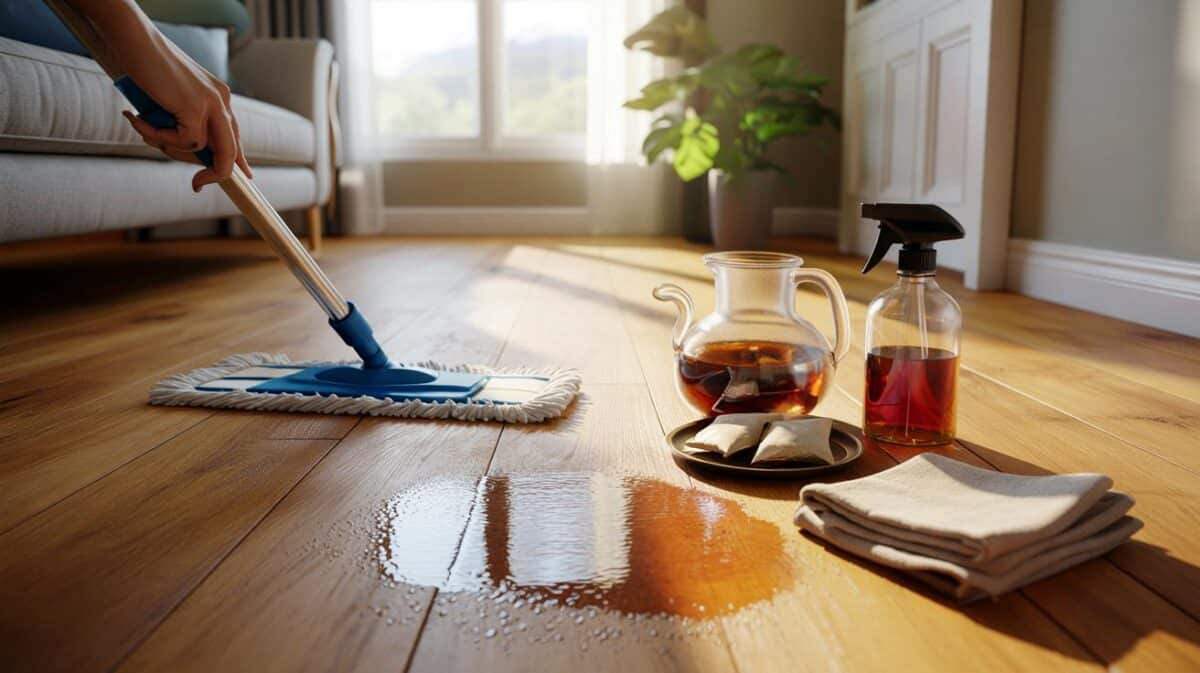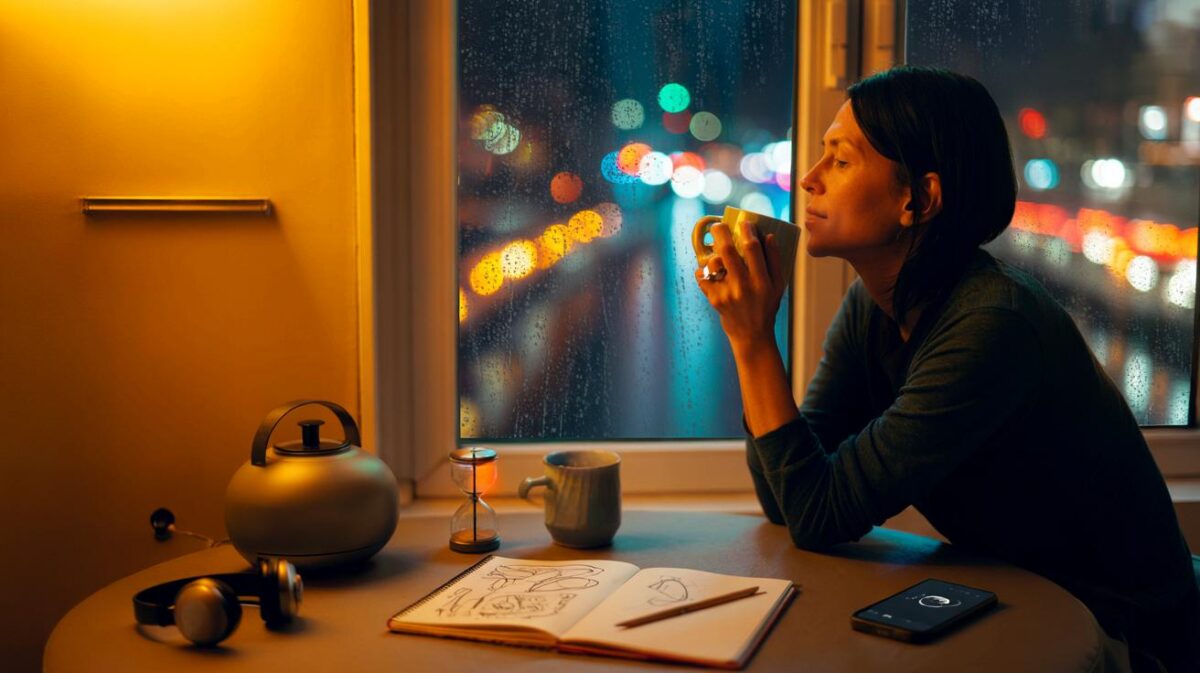Some people crave the hum of a crowded room. Others recharge when the door clicks shut and the world quietens for a while. Psychologists say that second group is often misunderstood — and quietly powerful.
She isn’t upset. She isn’t snubbing anyone. She’s creating a small island, letting the noise drain off so she can feel like herself again. When she comes back in, her eyes are clearer, her jokes land sharper, and she remembers the name of the bartender that everyone else forgot.
*It wasn’t rudeness; it was oxygen.*
Moments like this are easy to misread as aloofness or shyness. In truth, they often signal something sturdier than that: a habit that shapes confidence, focus, and a way of knowing where you end and other people begin. There’s a reason psychologists keep returning to the power of solitude. And it’s not what you think.
The quiet edge: what solitude shapes in a person
People who genuinely enjoy being alone usually aren’t running away; they’re tuning in. They notice their inner weather, recognise a spike of stress before it spills, and choose the next move with a cooler head. **Solitude is not loneliness.**
Psychologists describe this as better self-regulation and clearer self-concept. In plain terms: you cope better and you know yourself faster. That shows up in the small decisions — replying later rather than snapping, going for a walk rather than another coffee — and the big ones, like leaving a job that looks good but feels wrong.
Look closely and you’ll see a second strength: attention. Alone-time enthusiasts train it without thinking, like runners building lung capacity. Ten focuses that used to fray now hold. They can sit with a problem until the knot gives, which feeds creativity and that rare ability to ignore the chorus and trust their own read.
Ask Anna, a graphic designer in Manchester who eats lunch with a notebook and a view of the canal. She makes it a ritual: twenty minutes, pen moving, no phone. Her colleagues tease her for being “mysteriously unavailable”, yet she’s the one who spots the right colour way at 4 p.m. when everyone else is stale.
Once, she skipped her canal minute for a week. She felt it immediately. Ideas came out wrinkled. She snapped at a client. On Friday she went back to the bench, breathed, doodled a wonky ladder, and the concept laddered up in her head. That afternoon she delivered the pitch in two clean slides.
This isn’t magic. It’s recovery. Brains like rhythm: engage, then reset. Solitude provides the reset without the friction of managing other people’s signals. Fewer cues to parse means more space for working memory, and more room for meaning-making. That’s why alone-friendly people often come across as grounded. They’re not trying to be zen. They’re simply less scrambled.
There’s also the boundary piece. People who relish time alone tend to communicate limits earlier and more kindly. They’ll say, “I’m going to take an hour,” and mean it. That doesn’t make them less social. It makes their presence cleaner when they do show up, because they haven’t bargained away their energy in tiny slices all day.
And then there’s courage. Choosing solitude in a culture that rewards constant availability takes a bit of nerve. You have to stand there and hold your own gaze without the quick sugar of a like or a ping. That practice builds a sturdier backbone. It’s not loud. It doesn’t need to be.
Over time, these traits tend to braid into something that looks like quiet leadership. You trust your process. You don’t spook easily. You can be generous without being emptied. People feel safe around you because you aren’t leaking. That’s not an accident. It’s a habit grown in stillness.
How to harness solitude without slipping into isolation
Make it tiny and regular. Pick a micro-ritual that fits into real life: a ten-minute walk after breakfast without headphones; a cup of tea on the back step; a page of messy writing before you open your inbox. Anchor it to a cue you already do — keys on the hook, kettle on, shoes off — and let that be the starter’s pistol.
Protect the edges. Set your phone to “Focus” for that window and put it in another room, not on the desk glaring at you. Let one person at home or work know you’re trying it, so you don’t cave at the first buzz. Let’s be honest: nobody really does that every day. We’ve all had that moment when the scroll wins and the quiet gets pushed to tomorrow.
If you miss a day, shrug and try again. Don’t turn solitude into a new stick to beat yourself with.
To keep solitude nourishing rather than numbing, add two gentle checks. Before you start, name what you need from these minutes — calm, clarity, a decision. After, jot a single sentence: “I feel ____.” It sounds basic because it is. Humans forget obvious things when tired. This tiny loop tells your brain the ritual worked, so you’ll come back.
Watch for common traps. One is replacing solitude with screens — that’s not the same thing. Another is treating alone time as a reward you have to earn by doing enough. Flip it: solitude first, then the task. If you live with others, be explicit and kind: “I’m going to take 15 minutes in the bedroom to regroup, then I’d love to chat.” The script matters; it stops confusion before it starts.
You can also pair solitude with movement to keep energy from sinking. A slow lap around the block can reset your nervous system faster than any breathing app. And if your mind races when you stop, try a sensory anchor — count five sounds, notice four colours, trace three edges with your eyes. It gives your attention a gentle job.
“Alone time isn’t an escape from life,” says a London-based clinical psychologist I spoke to. “It’s a way of being fully present to it, without interference.”
- Say a boundary out loud once a week: “I’ll be back at 3.”
- Keep a “thinking walk” route you know by heart.
- Choose one activity you will always do alone — the first coffee, the last page of the day.
- When anxious, anchor to the senses: five sounds, four colours, three edges, two textures, one breath.
What it really says about your personality
Enjoying solitude doesn’t mean you’re cold, odd, or anti-social. It more often signals that you’ve learned how to restore yourself and, as a result, can meet others with better attention and patience. People who like being alone tend to have clearer values because they’ve spent time hearing their own voice without the crowd’s echo.
They’re more likely to notice early signals — of stress, of inspiration, of drift — and course-correct before things go sideways. They often know their creative rhythm and guard it with simple boundaries. They can sit with a problem longer, which helps with originality and better judgment when stakes are high.
That mix — steady attention, emotional self-knowledge, clean boundaries — can look understated next to big charisma. Yet in a jittery world, it’s a superpower. It won’t make you a saint. It will make you a sturdier human, and perhaps someone people turn to when the room starts to wobble. The door closes. Then the real work gets done.
| Key points | Detail | Interest for the reader |
|---|---|---|
| Solitude builds self-regulation | Time alone reduces external noise, helping you notice stress signals and choose responses | Feel calmer under pressure and recover faster after tough days |
| Focused attention grows in quiet | Fewer distractions strengthen deep work and creative problem-solving | Get more meaningful tasks done in less time |
| Clear boundaries make relationships cleaner | Communicating limits kindly preserves energy and presence | Show up with warmth, not resentment or burnout |
FAQ :
- Isn’t enjoying time alone just introversion?Not always. Introversion is a temperament; liking solitude is a skill anyone can grow, including extroverts who love people and also need a reset.
- How much alone time is “healthy”?There’s no magic number. Start with 10–20 minutes most days and adjust. Quality beats quantity.
- What if solitude makes me feel anxious?Keep it short, pair it with gentle movement, and use a sensory anchor. If anxiety feels overwhelming, consider speaking with a professional.
- Will spending time alone hurt my relationships?Used well, it improves them. Clear boundaries and a regulated mood make your presence steadier and kinder.
- Can I use solitude to boost creativity at work?Yes. Schedule protected solo blocks for thinking, close notifications, and debrief yourself with one line: “The idea I’m taking forward is…”.









